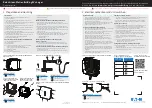
5
A. PREPARING TO CHARGE
1. If it is necessary to remove battery
from vehicle to charge, always remove
grounded terminal from battery first.
2. Be sure area around battery is well
ventilated while battery is being
charged. Gas can be forcefully blown
away by using a piece of cardboard or
other nonmetallic material as a fan.
3. Clean battery terminals. Be careful to
keep corrosion from coming into contact
with eyes.
4. Add distilled water in each cell until
battery acid reaches level specified
by battery manufacturer. This helps
purge excessive gas from cells. Do not
overfill. For a battery without cell caps(ie
Maintenance Free), carefully follow
the battery manufacturer’s recharging
instructions.
5. Study all battery manufacturer’s specific
precautions such as handling of cell
caps and charge rates.
6. Determine voltage of battery by referring
to car owner’s manual. Make sure that
output voltage range provided by
charger is compatible with the battery
intended to charge.
ALWAYS check
with battery manufacturer for specific
charging rate requirements.
B. CHARGER LOCATION
1. Locate charger as far away from battery
as DC cables permit.
2. Never place charger directly above
battery being charged; gases from
battery will corrode and damage
charger.
3. Never allow battery acid to drip on
charger when reading gravity or filling
battery.
4. Do not operate charger in a closed-in
area or restrict ventilation in any way.
5. Do not set a battery on top of charger.
6. Battery used for boats(marine) must be
removed and charged on shore.
BEFORE USE
C. DC CONNECTION PRECAUTIONS
1. Connect and disconnect dc output
clamps only after setting any charger
switches to off position and removing
AC cord from electrical outlet.
2. Attach clamps to battery posts and
twist or rock back and forth several
times to make a good connection. This
tends to keep clamps from slipping off
terminals and helps to reduce risk of
sparking. Never allow clamps to touch
each other.
GROUNDING AND AC POWER CORD
CONNECTION INSTRUCTIONS - Charger
should be grounded to reduce the risk of
electric shock. The electric cord of Charger
is equipped with a grounding conductor and
a grounding plug. The plug must be plugged
into an outlet that is properly installed and
grounded in accordance with all local codes
and ordinances (See Figure 1A).
!
DANGER
To reduce the risk of electric shock:
• Never alter AC cord or plug provided.
If it will not fit outlet, have proper outlet
installed by a qualified electrician.
• Improper connection can result in the risk
of an electric shock.
Fig.1A
GROUNDED OUTLET
GROUNDED PIN
































